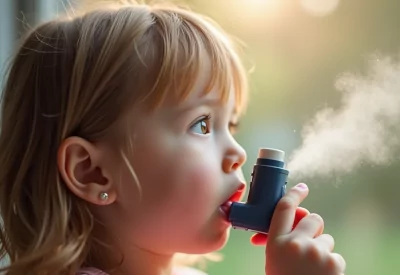How does Homeopathy Support
Asthma is a chronic respiratory condition affecting children. It causes inflammation and narrowing of the airways, leading to wheezing, coughing, and shortness of breath. While conventional medicine provides effective treatments for managing asthma symptoms, many parents seek complementary approaches like homeopathy to help improve their child’s quality of life and reduce reliance on conventional medications.

Understanding Childhood Asthma:
Asthma is characterized by periods of worsening symptoms (exacerbations) and periods of relative calm (remission). Triggers can vary widely from child to child and may include:
- Allergens: Pollen, dust mites, pet dander, mold spores.
- Irritants: Smoke, air pollution, strong odors, cold air.
- Respiratory infections: Viral or bacterial infections can worsen asthma symptoms.
- Exercise: Physical activity can trigger bronchospasm in some children.
- Stress and emotions: Stress and anxiety can exacerbate asthma.
Symptoms of an asthma attack can include:
- Wheezing: A whistling sound during breathing, often heard most clearly during exhalation.
- Coughing: A persistent cough, particularly at night or after exertion.
- Shortness of breath: Difficulty breathing, feeling breathless, or gasping for air.
- Chest tightness: A feeling of pressure or tightness in the chest.
Homeopathy’s Role in Managing Asthma Symptoms:
Homeopathy doesn’t aim to cure asthma but focuses on alleviating symptoms and improving the child’s overall respiratory health. A qualified homeopath will carefully assess the child’s symptoms and constitution to select the most appropriate homeopathic remedies. This assessment considers:
- The nature of the cough: Dry, loose, barking, rattling? Is it worse at night, during the day, or after exercise?
- The type of breathing difficulty: Wheezing, shortness of breath, chest tightness? When do these symptoms occur?
- Other symptoms: Fever, fatigue, nasal congestion, anxiety, etc.
- Asthma triggers: What situations or substances worsen the child’s symptoms?
- The child’s overall constitution: Temperament, energy levels, and sensitivity to environmental factors.
The chosen homeopathic remedies aim to reduce the frequency and severity of asthma attacks, improve lung function, and support the body’s natural ability to regulate inflammation. They may also help manage associated symptoms like anxiety and improve sleep quality.
Common Homeopathic Remedies for Asthma Symptoms (General Information Only):
This is not a recommendation for self-treatment. A qualified homeopathic practitioner should select remedies only after a thorough assessment. Some remedies that may be considered (but are not limited to) include:
- Ipecacuanha: Often used for asthma with severe nausea and vomiting.
- Antimonium tartaricum: May be helpful for asthma with rattling breathing and difficulty expelling mucus.
- Arsenicum album: Often considered for asthma with intense anxiety and a feeling of suffocation.
Important Considerations:
- Professional Consultation: Self-managing asthma with homeopathy is not recommended. Always consult a qualified homeopathic practitioner for assessment and to develop a personalized treatment plan.
- Conventional Medical Care: Homeopathy can complement conventional medical care but should not replace it. It’s crucial to continue using prescribed medications as directed by your child’s physician. Homeopathy should be considered a supportive therapy.
- Individualized Approach: Homeopathic treatment is highly individualized. What helps one child may not help another.
- Emergency Plan: It is essential to have an emergency plan in place for severe asthma attacks. This plan should include instructions on using rescue inhalers and when to seek immediate medical attention.
- Ongoing Monitoring: Regular check-ups with both your homeopath and your child’s physician are essential to monitor progress and adjust treatments as needed.
Homeopathy offers a potentially valuable complementary approach to managing asthma symptoms in children, focusing on improving their overall respiratory health and well-being. However, it’s crucial to prioritize professional guidance from both a qualified homeopathic practitioner and your child’s physician, ensuring a comprehensive and safe approach to managing this chronic condition.

